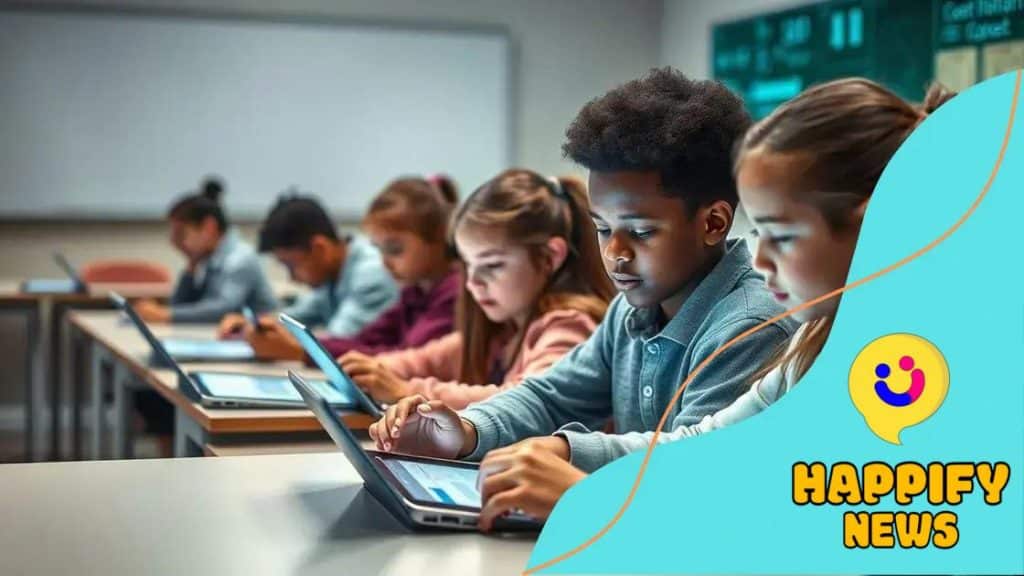AI optimizing learning outcomes: a new approach

Anúncios
AI optimizing learning outcomes enhances education by personalizing learning experiences, automating administrative tasks, and providing immediate feedback to both students and teachers.
AI optimizing learning outcomes has become a hot topic in educational circles. As technology evolves, more educators are exploring how artificial intelligence can enhance the learning experience for students. Have you wondered how these advancements might change classrooms forever?
Anúncios
Understanding AI in education
Understanding AI in education is vital as it reshapes how students learn and teachers instruct. This technology harnesses data processing to make learning more effective. By personalizing the experience, AI can meet individual student needs.
What is AI in Education?
Artificial Intelligence refers to the simulation of human intelligence in machines that are programmed to think and learn. In education, it uses algorithms to analyze student data and adapt teaching methods accordingly. Teachers can focus on what matters most: engaging with their students.
Benefits of AI in the Classroom
- Personalized learning experiences tailored to each student.
- Immediate feedback on assignments helping students improve.
- Automation of administrative tasks, allowing teachers more time for teaching.
Moreover, AI can assist in predicting student performance and pinpointing areas needing attention. For example, AI tools can analyze test results and identify trends to help educators adapt their strategies. The use of chatbots for answering student queries instantly is another exciting development.
Anúncios
Through these innovations, AI in education enhances engagement and motivation. Students interact with adaptive learning platforms that make learning fun. These platforms provide a variety of resources that cater to different learning styles.
Challenges to Consider
Despite its advantages, implementing AI in educational settings presents challenges. Issues regarding data privacy and the need for teacher training are at the forefront. Ensuring that all students have access to these technologies is crucial.
It’s essential that educators and institutions continue to explore the potential of AI while addressing these issues. By doing so, they can create an environment that not only embraces technology but also adapts to the changing educational landscape.
How AI personalizes learning experiences
How AI personalizes learning experiences is a crucial aspect of modern education. With the help of artificial intelligence, teaching is adapting more closely to the needs of each individual student. This personalization makes learning more effective and engaging.
Adaptive Learning Technologies
Adaptive learning technologies adjust content based on student performance. If a student struggles with a particular topic, the system provides additional resources to help them master it. Conversely, if a student excels, the system can offer advanced challenges to keep them engaged.
Benefits of Personalization
- Students learn at their own pace, improving retention.
- Tailored content meets diverse learning styles.
- Immediate feedback helps students understand their mistakes.
Incorporating artificial intelligence into education not only enhances learning experiences but also empowers students. For example, many AI platforms include quizzes and assessments that adapt as students progress, ensuring they receive the right level of challenge.
Additionally, AI can analyze data from student interactions to suggest personalized study plans. This feature allows learners to focus on areas needing improvement while reinforcing their strengths. It’s like having a personal tutor available 24/7.
Future Opportunities
As AI technology continues to advance, the potential for even more personalized learning experiences will grow. Future applications could include virtual reality environments tailored to individual preferences. Such innovations can bring subjects to life, allowing students to explore concepts deeply and interactively.
Moreover, integrating AI into classrooms can help teachers identify patterns in student learning. This information can guide educators in modifying their teaching strategies to maximize student success.
Benefits of AI for teachers and students

The benefits of AI for teachers and students are transforming education in many positive ways. By using AI tools, teachers can enhance their teaching methods while students experience improved learning outcomes.
For Teachers
AI helps teachers by automating administrative tasks. This includes grading assignments and managing schedules, which allows educators to focus more on teaching. With these tools, teachers gain more time to create engaging lessons and connect with students.
Improved Insights
- AI provides data analytics to track student progress.
- Teachers can spot learning gaps and adjust their approach.
- Individualized support becomes more accessible.
Moreover, AI systems give teachers insights into their students’ learning behaviors. For example, detecting patterns in performance data helps educators stay informed about which techniques work best for their classes.
On the student side, AI offers personalized learning as it adapts to each learner’s unique needs. Instead of a one-size-fits-all approach, students receive custom resources that fit their styles and paces.
For Students
Another benefit of AI for students is access to immediate feedback. With AI, students receive instant responses to their answers, guiding them to understand mistakes right away. This real-time feedback fosters a sense of ownership over their learning.
- Interactive tools keep students engaged.
- Room for practice without fear of judgment.
- Encouragement to seek help through chatbots.
Additionally, AI-powered platforms can help students prepare for standardized tests by offering tailored quizzes and study sessions. This ensures they focus on the areas where they need the most improvement.
Challenges in implementing AI solutions
The challenges in implementing AI solutions in education are significant, yet they should not deter institutions from embracing this technology. Understanding these challenges can help teams prepare effectively. One of the primary obstacles is the integration of AI into existing systems and curricula.
Data Privacy Concerns
Data privacy is a crucial issue. Schools must handle sensitive student information responsibly. Ensuring that AI tools comply with regulations like FERPA and GDPR is essential to protect student privacy. Mismanagement of data can lead to serious legal and ethical ramifications.
Cost of Implementation
- The initial investment in AI technology can be high.
- Training staff to use these tools requires time and resources.
- Upgrades and maintenance can strain budgets.
Moreover, many educational institutions face budget constraints, making it difficult to allocate funds for AI technologies. To overcome this challenge, schools can seek grants or partnerships with tech companies.
Another significant issue is the need for adequate training. Educators may feel overwhelmed by new technology. If teachers are not provided with proper training, the effectiveness of the tools may diminish. Effective training programs are essential for teachers to feel confident in using AI resources.
Equity and Access
Equity and access are critical considerations when implementing AI solutions. There’s a risk that wealthier schools will adopt these technologies faster, leaving underfunded institutions behind. This gap can widen educational disparities.
- Access to devices and high-speed internet is not uniform.
- Students from lower-income families may lag in their learning experiences.
- Schools must work to ensure all students benefit from AI technologies.
Lastly, there is the challenge of keeping pace with rapid advancements in AI technology. The education sector must continuously adapt to new tools and methods. This can be daunting, but it’s important to embrace innovation while ensuring that tools align with educational goals.
Future of AI in educational settings
The future of AI in educational settings holds immense potential as technology continues to evolve. As artificial intelligence expands, its impact on education will likely grow, creating exciting opportunities for both students and teachers.
Integration of Advanced Tools
In the coming years, we can expect even more sophisticated AI tools that enhance personalized learning experiences. Advanced algorithms will analyze student performance in real-time, allowing educators to tailor their teaching strategies dynamically. This means every lesson could be specifically designed to meet the unique needs of each student.
Use of Virtual and Augmented Reality
- AI will enable immersive learning environments.
- Students can explore historical sites or scientific concepts in a virtual space.
- Enhanced interaction and engagement through realistic simulations.
Furthermore, as virtual and augmented reality technologies combine with AI, classrooms may transform into interactive spaces where students can explore complex topics in a hands-on way. Imagine anatomy classes where students can visualize 3D models of the human body, or history lessons that take them through time periods.
Another possibility is the use of AI-driven tutors that can provide extra support beyond the classroom. These tutors would adapt to student needs, offering guidance and resources tailored to individual learning styles and pace. This could make additional help more accessible to students who need it, regardless of their background.
Continuous Learning for Educators
The role of teachers will also evolve with AI integration. Professional development will focus more on training educators to utilize AI tools effectively. This will help them stay ahead of new technologies while enhancing their teaching methods. Educators will become more like facilitators, guiding students through their personalized learning experiences.
Finally, ethical considerations around AI will gain importance. Discussions about data privacy, equity, and best practices will shape how AI is implemented. Ensuring that all students benefit from these advancements will be a priority.
In conclusion, the integration of AI in education offers transformative possibilities for both teachers and students. As we look to the future, we can expect AI to create more personalized, engaging, and effective learning environments. With advances in technology, classrooms will likely become more interactive, allowing students to explore ideas deeply and learn at their own pace. While challenges exist, such as data privacy and access, the benefits of incorporating AI can lead to enriched educational experiences. By embracing these innovations, we can prepare students for a successful future.
FAQ – Frequently Asked Questions about AI in Education
How does AI personalize learning experiences for students?
AI analyzes data on student performance and adapts lessons to meet individual needs, providing targeted resources and support.
What are the main benefits of AI for teachers?
AI helps teachers automate tasks like grading and managing schedules, allowing them more time to focus on instructional planning and student engagement.
What challenges might schools face when implementing AI?
Schools may encounter issues related to data privacy, costs of implementation, and ensuring equitable access for all students.
What innovations can we expect from AI in the future of education?
Future innovations may include AI-driven tutors, immersive learning environments using virtual reality, and enhanced analytics to support educators in their teaching strategies.






